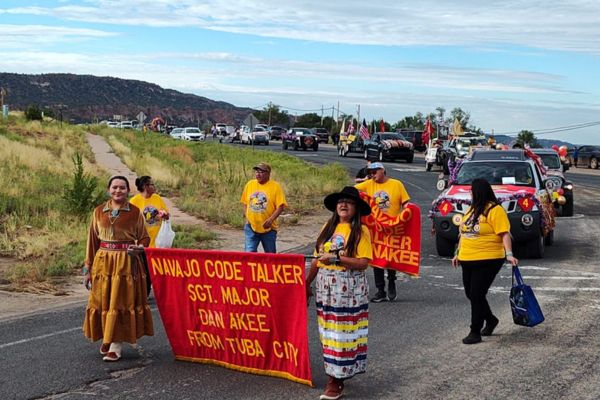
- Details
- By Native News Online Staff
Navajo Nation is hosting celebrations in Window Rock, Arizona, today in honor of National Navajo Code Talkers Day to recognize the brave Diné men whose service was crucial to the United States' victory in World War II.
Today’s events take place from 8 a.m. —6 p.m. MST at Navajo Nation Veterans Memorial Park and include a parade, an honor run by NavajoYES, a welcome address, speakers, descendants exhibit, and gourd dancing.
The day honoring the Navajo Code Talkers, a group of Diné citizens who served in the U.S. Marine Corps during World War II using the Navajo language to transmit secret tactical messages, was established by a proclamation issued by then-president Ronald Reagan.
It was during World War II, in the South Pacific theater, the Navajo Code Talkers used a secret code that was never broken by the Japanese that enabled the United States military to communicate with each other to ensure victory.
Prior to the Navajo Code Talkers' entry into the South Pacific theater, the Japanese were quite proficient in breaking into U.S. military radio communications and transmissions to decipher the military codes.
To counter this weakness in communication, 29 Navajo men, some still in their teens, were recruited by the U.S. Marine Corps. They traveled to Camp Pendleton, north of San Diego, to develop the code that relied on the Navajo language. The code was 17 pages long, and the Navajo Marines had to memorize it prior to going into battle. After several weeks of training, they were shipped out to fight in the South Pacific.
By the end of World War II, more than 400 Navajo men were recruited and trained in the area of communications. In the South Pacific, these brave Navajo men fought in battles that included Iwo Jima, Okinawa, Guadalcanal, Wake Island, Saipan, Guam, Midway, and Tarawa.
Their valiant contributions were credited with saving the lives of countless American soldiers and are considered essential to the Allied victory in the South Pacific and considered by experts as helping to save democracy.
The Navajo Code Talkers’ work remained classified until 1968, 23 years after World War II ended in 1945.
This year’s events will honor the three Code Talkers who are still with us: John Kinsel Sr. of Lukachukai, Arizona, Thomas H. Begaye from Chéch’iltah, New Mexico; and Peter MacDonald Sr. from T’iis Názbąs.
Regan Hawthorne is one of the key organizers of the Navajo Code Talker Day event. He is a descendant of Navajo Code Talker Roy Hawthorne, who saw action in Okinawa.
Hawthorne said that the three code talkers will be given a personal introduction by former U.S. Marine Sgt. Gilbert James.
“We hold our breath looking forward to next year’s celebration, so I want to encourage everybody who considers the Navajo Code Talkers as heroes,” Hawthorne told the Navajo Times. “I want them to come out and celebrate this particular occasion to honor the three remaining code talkers.”
More Stories Like This
Native News Weekly (August 25, 2024): D.C. BriefsUS Presidents in Their Own Words Concerning American Indians
NDAA passes House; Lumbee Fairness Act Advances
NFL, Vikings to Host Native All-American Game, Youth Flag Clinic
Senate Committee on Indian Affairs Passes 12 Bills to Strengthen Tribal Communities
Help us defend tribal sovereignty.
At Native News Online, our mission is rooted in telling the stories that strengthen sovereignty and uplift Indigenous voices — not just at year’s end, but every single day.
Because of your generosity last year, we were able to keep our reporters on the ground in tribal communities, at national gatherings and in the halls of Congress — covering the issues that matter most to Indian Country: sovereignty, culture, education, health and economic opportunity.
That support sustained us through a tough year in 2025. Now, as we look to the year ahead, we need your help right now to ensure warrior journalism remains strong — reporting that defends tribal sovereignty, amplifies Native truth, and holds power accountable.
 The stakes couldn't be higher. Your support keeps Native voices heard, Native stories told and Native sovereignty defended.
The stakes couldn't be higher. Your support keeps Native voices heard, Native stories told and Native sovereignty defended.
Stand with Warrior Journalism today.
Levi Rickert (Potawatomi), Editor & Publisher


